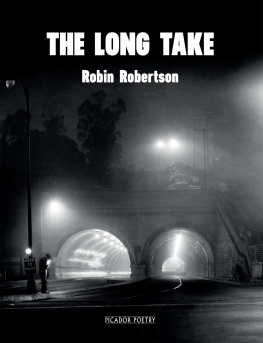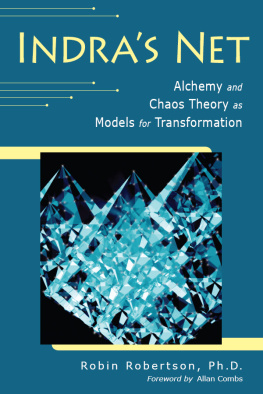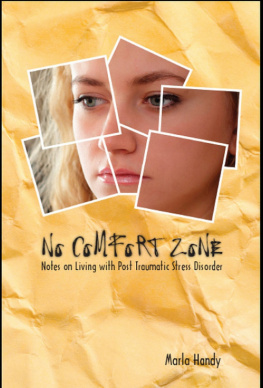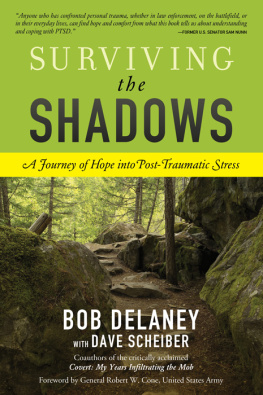Robin Robertson - The Long Take
Here you can read online Robin Robertson - The Long Take full text of the book (entire story) in english for free. Download pdf and epub, get meaning, cover and reviews about this ebook. year: 2018, publisher: Picador, genre: Detective and thriller. Description of the work, (preface) as well as reviews are available. Best literature library LitArk.com created for fans of good reading and offers a wide selection of genres:
Romance novel
Science fiction
Adventure
Detective
Science
History
Home and family
Prose
Art
Politics
Computer
Non-fiction
Religion
Business
Children
Humor
Choose a favorite category and find really read worthwhile books. Enjoy immersion in the world of imagination, feel the emotions of the characters or learn something new for yourself, make an fascinating discovery.
- Book:The Long Take
- Author:
- Publisher:Picador
- Genre:
- Year:2018
- Rating:3 / 5
- Favourites:Add to favourites
- Your mark:
- 60
- 1
- 2
- 3
- 4
- 5
The Long Take: summary, description and annotation
We offer to read an annotation, description, summary or preface (depends on what the author of the book "The Long Take" wrote himself). If you haven't found the necessary information about the book — write in the comments, we will try to find it.
The Long Take — read online for free the complete book (whole text) full work
Below is the text of the book, divided by pages. System saving the place of the last page read, allows you to conveniently read the book "The Long Take" online for free, without having to search again every time where you left off. Put a bookmark, and you can go to the page where you finished reading at any time.
Font size:
Interval:
Bookmark:


 And there it was: the swell and glitter of it like a standing wave the fabled, smoking ruin, the new towers rising through the blue, the ranked array of ivory and gold, the glint, the glamour of buried light as the world turned round it very slowly this autumn morning, all amazed. And it stayed there, watching, as they made toward it, the truck-driver and the young man, under pylons, wires, utility poles, past warehouses, container parks, deserted lots, between the long oily marshes, landfill sites and swamps, before slipping down under the Hudson, and coming up on the other side to find a black wetness of streets trashed and empty and the city gone. Try the docks. They can always use men. * It was in me, burning like a coal-seam fire. The road.Back there in Broad Cove, on the island, it was just working the mines or the boats.
And there it was: the swell and glitter of it like a standing wave the fabled, smoking ruin, the new towers rising through the blue, the ranked array of ivory and gold, the glint, the glamour of buried light as the world turned round it very slowly this autumn morning, all amazed. And it stayed there, watching, as they made toward it, the truck-driver and the young man, under pylons, wires, utility poles, past warehouses, container parks, deserted lots, between the long oily marshes, landfill sites and swamps, before slipping down under the Hudson, and coming up on the other side to find a black wetness of streets trashed and empty and the city gone. Try the docks. They can always use men. * It was in me, burning like a coal-seam fire. The road.Back there in Broad Cove, on the island, it was just working the mines or the boats.Taking on the habit of the old ones the long stare out to sea becoming like a thorn tree, twisted hard to the shape of the wind, its grain following the grain of the weather; cloth caps and tweed, ruddy, raw-boned faces, wet eyes, silences that lasted weeks; the women wringing red hands or dishcloths or the necks of chickens just to make more silence. * He walks. That is his name and nature. Rows of buildings, all alike, doors and windows, people going in, looking out; inside halls and stairs, halls and stairs, and more doors, opening and closing. Street after street of buildings, all the same. People, all the same. The clutter and color: everything moving on the street, and across it, straight lines and diagonals.
Drug-stores, grocery stores, snack joints, diners. Missions. Bars. Blocks. Corners. Intersections.
A dropped crate or a childs shout, or car backfiring, and hes in France again, that taste in his mouth. Coins. Cordite. Blood. So loud. And bright.
No place to ease the eyes. To hide. So this is what happens between one night and the next: this is day. A never-ending rehearsal with a cast that changes all the time but never gets it right. Dropping things. Walking into each other.
Tripping on the curb. Every door, every window, opening and closing, automobiles sliding past, the calls of the vendors, shrieks of children, horses and carts, trolley-cars and delivery trucks. People in a hurry, in every direction, wired to some kind of a grid. Maybe from up high you could see a plan for it all, like a model-train layout. Not down here though. Everythings going too fast and there are too many people and cars and Im holding on to this stop-sign because Im frightened and I know Im going to die.
A hard migraine of color-clash, daggering light, and sun laid out everywhere in white flags. Not a shadow in this world. * The road invisible under heavy snow: a clean and softened land, fluent and dazzling down to the oceans slate. The only color is the lichen clinging to twigs, bright as pollen, and back at the house, the berries of the rowan tree, one arm across the door. * Night. The citys gone. In its place, this gray stone maze, this locked geometry of shadows, blind and black, and angles hurt into the sky, symmetries breaking and snapping back into line.
The green Zs of fire-escapes; wires criss crossing whats left of the light to a tight mesh. The buildings close around a dead-end, then spring open to the new future: repetition, back-tracking, error, loss. * Father just stood at the door. The war was one thing, but this is another. Youre the first of us to leave in a hundred and seventy years. * He wanted to see this country, so he did: the benches of Hanover Square at dawn, Fanellis, the Spot, the White Horse, the parks, the pawn shops, the 15-cent diners, the Green Door, the Marathon, the Garden Bar, a Beekman Street archway with a drink after dark. Hed surprise his reflection in a store window: see the curly-haired boy with his fishing pole; the skinny white soldier with blank eyes, getting thinner.
He walks among ghosts. Never sees the same face twice. He navigated by the sun when he could find it between the buildings, the canyons. The subways are rivers, underground, flash-flooding every five minutes in a pulse of people. People from all over, all colors, a hundred languages: Italian, Polish, Russian, German, Yiddish, Spanish from the Mexicans, the Puerto Ricans, that Chinese like a tape running backward, at speed. People; just like him.
Having given up the country for the city, boredom for fear, the faces gather here in these streets like spectators in a dream. They wanted to be anonymous not swallowed whole, not to disappear. Now they spend their days on South Street or down at the Battery, their nights in the Bowery flophouses, the cage-hotels, tight packed like herrings in a creel. * Cold as Candlemas. A skin of ice on the water-glass by the bed is the only thing that doesnt shake under the rails of the 3rd Avenue El overhead. Through the gray net curtain, above the tenements outside, the sky jitters awake like a loose connection; lightning glows behind the walls of cloud.
Somewhere, up north of here, is the Chrysler, and the Empire State. Somewhere south theres Liberty. * Going down into the subway by the same metaled stairs as that troop ship in Southampton: the hot churn and thundering of the machine, riveted corridors and halls, darkness, sudden light, dead air, the clattering echo of footsteps on steel. The white, unseeing eyes. * It was all about timing. Waiting to jump from the scramble net down the side of the merchant ship to the LCA below.
Trying to find the rhythm of it: the swell of the water, the boats colliding. Your best chance was just before the landing craft slammed against the ships hull. Mistiming the jump meant drowning or crushing. You got it right. Picked yourself up. The steel deck slippery with vomit. * Up on the El, trying to keep warm near the old pot-bellied stove by the change-booth and turnstiles, he liked to lean over, watch the people seething below: a river of hats following a current, streaming round obstacles then re-forming: gray and brown and black.
It came to him then. You can never step into the same city twice. That was it. Living here was like trying to cross a river in spate and hed just found his footing, or at least a way of looking at it from a distance. Close up, nothing here was beautiful, and so much now was a close-up shot. He needed to re-calibrate, focus on all this new geometry, light and shadow, black and white: take the long view.
Like staring out to sea. * Sea-sick from the gridded streets, the brick towers and mirrors and black-drop canyons he fixed, queasily, on the steady line of Brooklyn Bridge. He found a room, a fifth-floor walk-up on Water Street for six dollars a week, and no down-payment needed for the de-mobbed with his veteran pin. He got hired the next day in the shape-up; found himself a box-hook and a job on the docks. Ice webbed the wooden pilings, the ice-spill opaque and raised and slippery-smooth like dried glue. * The smell of stewed tea and wet clothes, smuts from the oil lamps, the valves in the radio like embers, glowing; the penetrating, never-ending rain and winter, like a white door closing for six months. *
Font size:
Interval:
Bookmark:
Similar books «The Long Take»
Look at similar books to The Long Take. We have selected literature similar in name and meaning in the hope of providing readers with more options to find new, interesting, not yet read works.
Discussion, reviews of the book The Long Take and just readers' own opinions. Leave your comments, write what you think about the work, its meaning or the main characters. Specify what exactly you liked and what you didn't like, and why you think so.
















